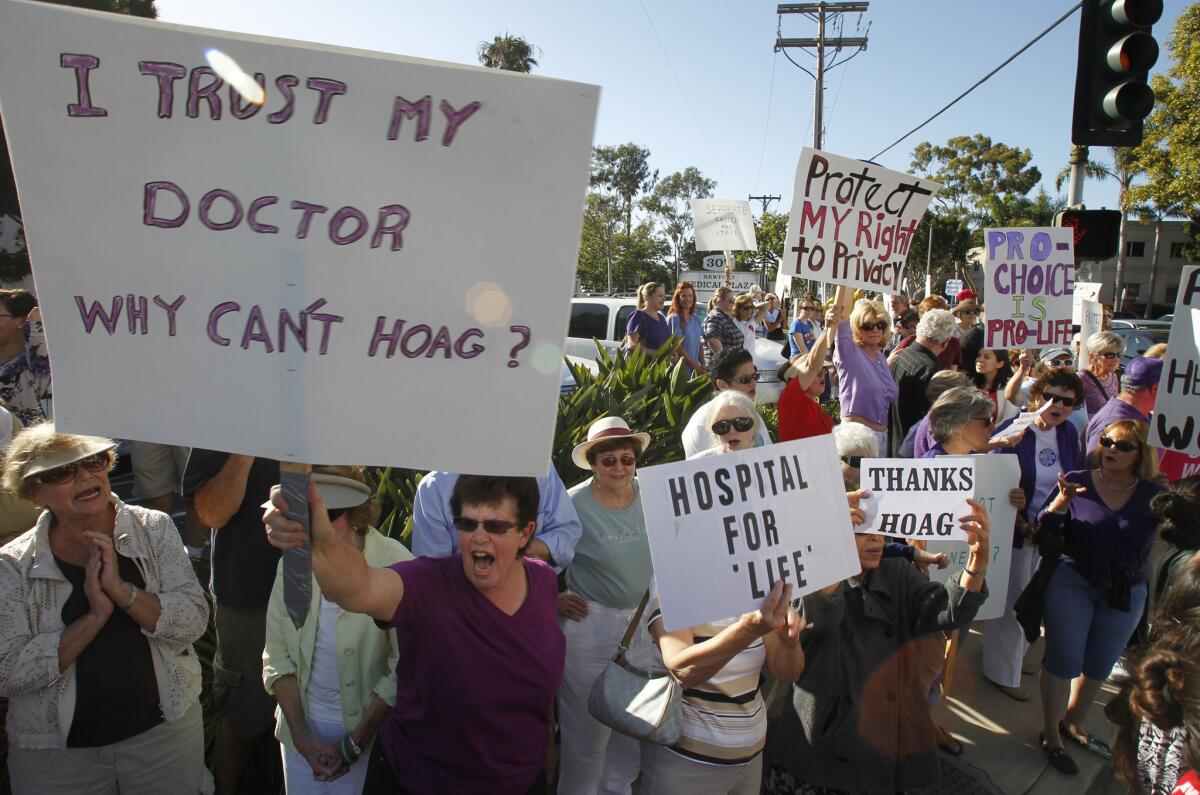Column: Here’s another case of a Catholic hospital interfering with patient care

The shape of things to come? Demonstrators gather outside Hoag Hospital in Newport Beach on June 20, 2013, to protest a ban on abortions at Hoag after it partnered with a Catholic healthcare provider.
Rebecca Chamorro, 33, is a married woman who is due to give birth to her third child by C-section on Jan. 28. She and her husband decided they don’t want any more children after their third, so she asked her obstetrician to perform a tubal ligation immediately after her Cesarean delivery to prevent further pregnancies.
That’s the medical standard of care for tubal ligations: The safest way to perform the procedure is immediately after delivery, in order to avoid a second surgical procedure under anesthesia. Chamorro’s physician, Samuel Van Kirk, asked for authorization from her hospital, Mercy Medical Center in Redding.
Religious institutions that provide services to the general public should not be allowed to discriminate or deny health care.
— Redding attorney Rachel Miller, who fought Dignity Health to obtain a tubal ligation
The hospital turned him down. Not because its administrators thought the procedure was medically unwise, dangerous or illegal, but because it violates the Catholic religious principles to which the hospital’s owner, Dignity Health, subscribes. Although the letter denying Chamorro’s procedure came from Mercy’s vice president for medical affairs, James De Soto M.D., the rules he cited -- the Ethical and Religious Directives for Catholic Health Care Services -- were produced not by a medical body, but by the U.S. Conference of Catholic Bishops.
We know about this matter because Chamorro has taken Mercy Medical and Dignity Health to court. She’s seeking a preliminary injunction from a state judge in San Francisco, barring Dignity Health from interfering with her doctor’s judgment. A hearing is scheduled for Thursday, which would be well in advance of her scheduled C-section. But there’s the chance that her baby will come earlier, and if that happens without the injunction being issued, she’ll be out of luck.
Chamorro’s case underscores a developing crisis in American healthcare, which is tied to the evolution of Catholic hospital chains into a major provider of medical services -- and the sole provider of some services in some communities. Although Mercy Medical is one of three hospitals in Redding, it’s the only one with a labor and delivery ward. The next closest option is 70 miles away.
The nation’s 645 Catholic hospitals are coming to play a huge role in the hospital business, constituting the largest group of nonprofit healthcare providers in the country, according to the Catholic Health Assn. of the United States, caring for one in six patients. Dignity Health describes itself as “the fifth largest health system in the nation and the largest hospital provider in California,” with 30 facilities in the state.
That wouldn’t be cause for concern if not for these hospitals’ practice of placing non-medical concerns ahead of those of patients and their doctors. The Ethical and Religious Directives, or ERDs, bar Catholic hospitals from performing “elective abortions” (a religious, not medical term), providing contraceptives or performing in vitro fertilization, tubal ligations or vasectomies if the latter are aimed at preventing pregnancies.
Typically, Catholic hospitals adhere to the ERDs through policies on which church prelates exercise a strong voice. Mercy Medical’s policy barring tubal ligations for sterilization was developed “in consultation with” Bishop Jamie Soto of the Diocese of Sacramento and his representatives, according to a declaration by a hospital administrator filed in Chamorro’s lawsuit.
These rules were relatively unobjectionable when the typical Catholic hospital might have been a parochial facility concerned mostly with caring for local Catholics or as part of spiritual outreach. But their footprint is much greater now. Catholic healthcare systems receive billions of dollars in state and federal taxpayer funds and dominate some communities’ health landscapes.
That should place a heavier responsibility on Catholic hospitals to comply with medical judgments, says Ruth Dawson of the California ACLU, which is representing Chamorro. Indeed, her case could rewrite the rules governing the conduct of religious healthcare institutions functioning in the secular field. “We hope this case will lead to the precedent that organizations that accept public funds can’t discriminate based on religious doctrine,” Dawson said.
As nonsectarian hospitals merge with their Catholic brethren for financial reasons, they can get cornered into complying with some Catholic directives, shrinking healthcare options, especially for women of reproductive age. That was the case when Newport Beach’s Hoag Hospital joined in 2013 with the Catholic St. Joseph Health System and, to the surprise of Hoag’s medical staff, abortions suddenly were banned on its premises. I documented the fallout here and here.
Some Catholic healthcare leaders fear that in the conflict between Catholic principles and the secular world, the former will lose out. Dignity Health, as it happens, has been cited as a harbinger of the compromise -- the organization doesn’t impose the ERDs on sterilization and some other practices on nonsectarian merger partners, except for banning abortions.
As is often the case when a big institution tries to impose its religious doctrine on others who don’t share it, Dignity Health, a $12.4-billion enterprise, is painting itself as the victim of a campaign by a 33-year-old mother of two to deprive it of its rights. The hospital group called Chamorro’s application for a temporary restraining order “an unprecedented attack on a Catholic hospital,” and an infringement of Mercy Medical’s “constitutional right to freedom of religion.”
Dignity Health’s lawyers dismissed Chamorro’s requested procedure as “not medically necessary” and suggested that it might “increase the risks” of her delivery, an assertion contradicted by her doctor. (Evidently the lawyers think that two surgeries are safer than one.) Chamorro acknowledged that “other hospitals offer” tubal ligations, but Dignity Health’s lawyers didn’t mention that in its community, Mercy Medical has an effective monopoly on labor and delivery services.
“There are numerous products and procedures available to her that provide the same contraception without asking a court to force a Catholic hospital to violate the ERDs,” they wrote, arguing that Chamorro is harassing the hospital only to avoid her own “inconvenience.”
One problem with non-medical doctrines such as the ERDs is that they can lead to inconsistent and arbitrary decisions. That appears to be happening here. Dr. Van Kirk says that although Mercy Medical has refused his request to perform tubal ligations on more than 50 patients over the last eight years, some requests have been approved. He said in a declaration in the lawsuit that he has been unable to figure out the pattern of approvals and denials, except that the requests are more often granted for “women over the age of 35 with a history of two more more previous C-sections.”
Just last summer, Mercy Medical relented after initially denying a tubal ligation for another patient represented by the ACLU. Its change of heart came after receivng a protest letter from the ACLU on behalf of Rachel Miller, a Redding attorney.
But the hospital hasn’t explained how Miller’s case differs from Chamorro’s. In a written statement, Dignity Health said Mercy Medical allows tubal ligations “when their direct effect is the cure or alleviation of a present and serious pathology and a simpler treatment is not available.” But Chamorro’s physician said tubal ligations are “only ever ... performed to prevent future pregnancy.”
That was so for Miller, who wrote last year that before delivering her second child, she and her husband decided that two would be enough. Mercy Medical initially refused her procedure because the ERDs define it as “intrinsically evil.” “Not only is this label far from objective medical advice,” Miller wrote, “it illustrates the extent of how extreme religious doctrine is trumping sound medical practice. ... Religious institutions that provide services to the general public should not be allowed to discriminate or deny health care.”
The ACLU says Dignity Health’s approval of the tubal ligation for Miller and others while denying it to Chamorro opens it to the charge of violating California law, which forbids a hospital that allows any sterilizations for contraceptive purposes to impose non-medical conditions on anyone seeking them.
Critics of the Affordable Care Act are fond of complaining that by mandating a certain level of insurance coverage, it interposes government bureaucrats between patients and their doctors. They’re wrong, but here’s an example of hospital administrators and religious prelates stepping between a woman and her doctor, wielding rules and regulations that have nothing to do with medicine and may even compromise her health.
If Rebecca Chamorro prevails in obtaining the care she seeks, she will have landed a powerful blow for driving religious doctrine out of the operating room.
Keep up to date with Michael Hiltzik. Follow @hiltzikm on Twitter, see our Facebook page, or email michael.hiltzik@latimes.com







